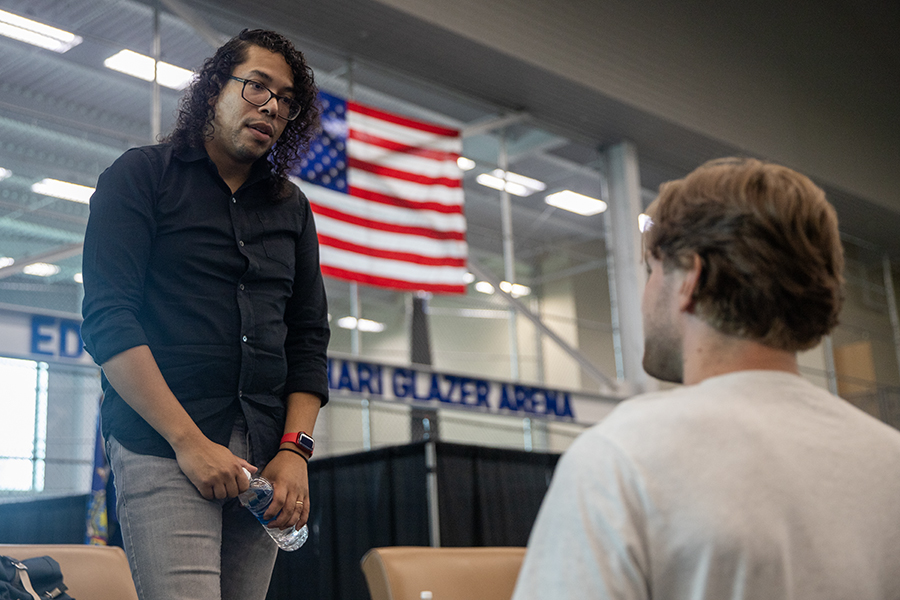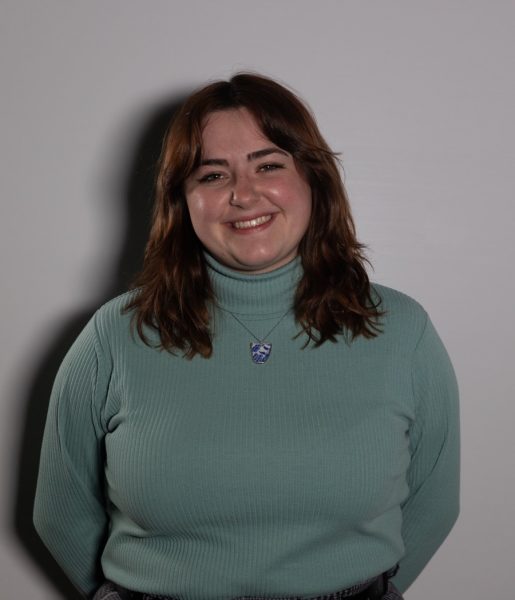Ithaca College hosted a moderated discussion Aug. 21 with the Emmy-nominated and Peabody-winning producer and writer, Steven Canals. Moderated by Eleanor Kay ’23, Canals gave insight into his path through education at a primarily white institution as a person of color and talked about how he navigated his professional life with the success he has had in screenwriting and producing.
Canals most notably is the co-creator and producer of the FX television show “Pose,” which has the largest transgender cast in television history, highlighting LGBTQIA+ people of color. He was also a staff writer on “Dead of Summer” in 2016.
Canals’ visit was co-sponsored by the Office of New Student and Transition Programs; the President’s Office; the BIPOC Unity Center; and the Center for LGBT Education, Outreach and Services and was held in the Athletics and Events Center. The rows set up for students were filled, an excited buzz circling the crowd before Canals began the discussion.
Canals began by discussing his upbringing and how it was impacted by the HIV/AIDS epidemic in the 80s. He said his working-class family’s deep love for music, film and television became a salvation for him.
“My parents, who were very young in their early 20s … when they had me, were very supportive of any creative endeavors,” Canals said. “I think they wanted to certainly break the cycle and so they were very encouraging.”
He later went on to talk about his opportunity to first start filming, highlighting his experiences joining a youth ministries program which allowed him to begin using a camera. He said this sparked his creativity to use his voice through the channel of film on topics that he found important — in this case, his first documentary short.
Canals’ humble upbringing resonated with first-year Ruby Kiesewalter, who said that it is inspiring to see people from smaller backgrounds succeed.
“I think it’s almost discouraging to look in the media and see big figures like that and know they came from wealth,” Kiesewalter said.
Canals took a less traditional route through college, taking a two-year gap year before starting and adding an extra year to finish. While in college, he said he found that being in a creative arts field could be incredibly discouraging.
“It’s difficult to be in an academic environment where someone is telling you, ‘Yeah, but there’s something off about the way that you’re expressing yourself,’” Canals said.
Sadie Evans, a first-year student who attended the discussion, felt similarly and said that as an aspiring screenwriter, she finds that her career is less stable than some of her peers who are focused on careers with more linear paths.
“It’s a nerve-wracking experience because you don’t know what’s guaranteed with the future financially, creatively, in general, and there’s a lot of doubt that comes with that, like self-doubt, so hearing someone talk about it and talking about working through the struggle was really important for me to continue what I love doing,” Evans said.
Canals had attended Binghamton University for his B.A. and M.A. After his graduation, he worked in student affairs and was a residence hall director for SUNY Cortland, and then worked as the associate director for Gender and Sexual Orientation Initiatives at Allegheny College in northwestern Pennsylvania.
During the discussion, Canals then turned his attention to addressing the first-year students in the audience, talking about how orientation was one of the first big steps during his time at college.
He said he felt like it was hard to go up to other students and start a conversation, and found that the schedule of orientation helped.
When asked about campus involvement and activities, Canals said he had joined a photography club and was also given opportunities through this to learn the methods behind physical film. He also went on to mention a talk show that he worked on during his junior year of college with a friend to discuss some of their favorite films.
“We’d talk about if we like the film, and then what things we thought were really interesting about it,” Canals said, “So those were, I think those are probably the two experiences that were the closest to the work that I’m doing now.”
Canals went on to speak about the importance of focusing on his own work in college, regardless of whether others’ work is better. By limiting that type of comparison, he said he felt that he began to see himself more personally and creatively.
Students enjoyed Canals’ message, which gave the incoming first-years a great kick-off talk about how to get and stay involved, and that despite there being challenges in life, it is crucial to keep moving forward.
“I think it’s encouraging, because they came from a small town themselves, a smaller college, a smaller city, wherever, and they were able to create something with themselves,” Evans said, “So I think it can inspire students and give them the motivation and the hope that they can also do something like that as well.”
Sarah O’Malley, a first-year student, also appreciated the talk, as she said she found it helpful for her career path.
“I liked him a lot, especially for me. I want to go into directing as well so the fact that he was giving advice on that aspect was what I liked about it,” O’Malley said.
Editor’s note: Eleanor Kay is a former managing editor of The Ithacan









